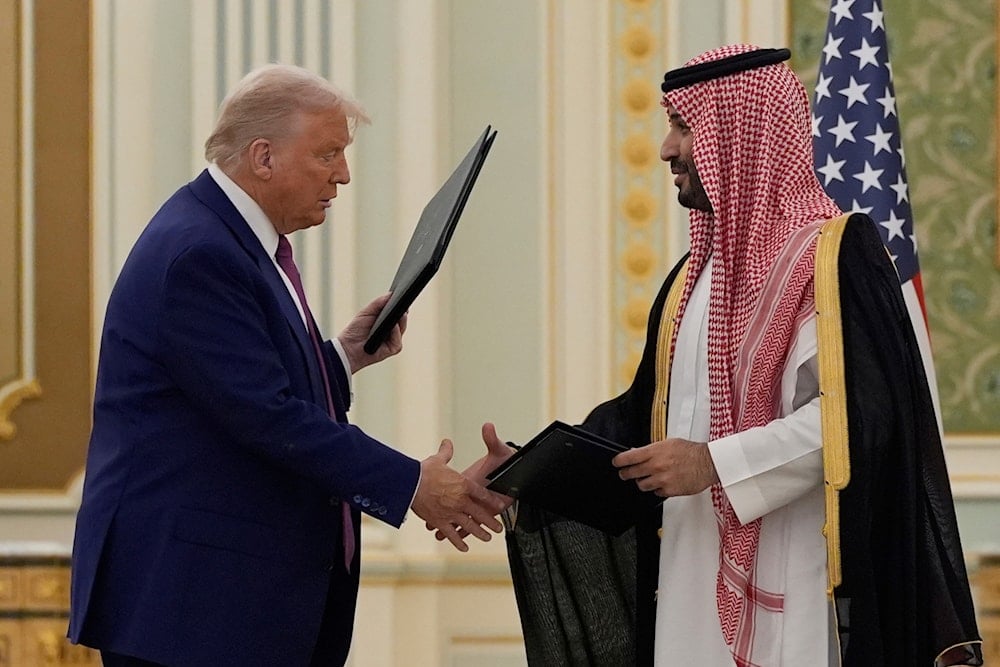US, Saudi Arabia sign landmark $600bln investment agreement
Saudi Arabia signs a landmark $600 bln deal with the US, which will see cooperation between both countries across numerous sectors and industries.
-

President Donald Trump and Saudi Crown Prince Mohammed bin Salman shake hands after exchanging documents during a signing ceremony at the Royal Palace in Riyadh, Saudi Arabia, Tuesday, May 13, 2025 (AP)
US President Donald Trump signed a wide-ranging economic agreement with Saudi Arabia on Tuesday, launching a multi-billion-dollar investment partnership as part of his Gulf tour.
The White House announced that Saudi Arabia is set to invest more than $600 billion in the United States, including the largest arms deal and one of the most comprehensive economic accords in the history of US-Saudi relations.
"While energy remains a cornerstone of our relationship, the investments and business opportunities in the kingdom have expanded and multiplied many, many times over," Saudi Minister of Investment Khalid al-Falih said at the opening of a high-level meeting.
Al-Falih added that when Saudis and Americans work together, “very good things happen; more often than not, great things,” a sentiment echoed during a meeting at the Royal Court, where President Trump referred to Crown Prince Mohammed bin Salman as a "friend", reaffirming the strength of bilateral ties, according to a Wall Street Journal report.
A Saudi-US investment forum held during Trump’s visit brought together major financial figures, including BlackRock CEO Larry Fink, Blackstone CEO Stephen Schwarzman, and Treasury Secretary Scott Bessent.
Elon Musk also joined the gathering, holding brief conversations with both Trump and the Crown Prince, and later attending a lunch meeting alongside OpenAI CEO Sam Altman and other US executives.
US-Saudi partnership covers AI, defense, and energy cooperation
The economic collaboration is deeply tied to Saudi Arabia's Vision 2030 reform agenda, which aims to reduce the kingdom’s dependence on oil, which still accounts for 62% of government revenue, and diversify its economy through large-scale development projects like NEOM.
NEOM Deputy CEO Rayan Fayez noted, "About a billion dollars of investment is being made in frontier technologies, and obviously, it is no surprise that the lion's share of these investments has gone into US companies."
AI
Among the high-profile deals, Google, Datavolt, Oracle, Salesforce, AMD, and Uber will jointly invest $80 billion in the technology sectors of both countries. Saudi firm DataVolt alone plans to invest $20 billion in artificial intelligence data centers and energy infrastructure in the United States.
Infrastructure
US engineering firms, including Hill International, Jacobs, Parsons, and AECOM, are set to lead infrastructure projects in the kingdom, such as King Salman International Airport, King Salman Park, The Vault, and Qiddiya City, contributing over $2 billion in US service exports.
Manufacturing
In manufacturing, GE Vernocas will export $14.2 billion worth of gas turbines and energy solutions, while Boeing will supply Avilease with 737-8 aircraft valued at $4.8 billion.
Healthcare
The healthcare sector is also a beneficiary with Shamekh IV Solutions, LLC, investing $5.8 billion in the United States, including the establishment of a high-capacity IV fluid manufacturing facility in Michigan.
Funds
Several joint investment funds are being formed to inject capital into key US sectors, including the $5 billion Energy Investment Fund, the $5 billion New Era Aerospace and Defense Technology Fund, and the $4 billion Enfield Sports Global Sports Fund.
Defense
On defense, the White House highlighted the nearly $142 billion agreement as the largest arms deal ever signed between the two countries.
"The United States and Saudi Arabia signed the largest defence sales agreement in history -- nearly $142 billion, providing Saudi Arabia with state-of-the-art warfighting equipment," the White House said in a statement.
The arms deal spans five key areas:
- Air force advancement and space capabilities;
- Air and missile defense;
- Maritime and coastal security;
- Border security and land forces modernization;
- Information and communication systems upgrades.
It also includes training and support to enhance the Saudi Armed Forces, including improvements to military academies and medical services.
Energy
Energy cooperation is expanding through new bilateral agreements. The US Department of Energy and Saudi Arabia’s Ministry of Energy have signed a partnership to promote innovation, development, and infrastructure deployment.
MoC
Additionally, a Memorandum of Cooperation was signed between the US Department of Energy and Saudi Arabia’s Ministry of Industry and Mineral Resources to boost collaboration in mining and mineral resources.

 4 Min Read
4 Min Read










